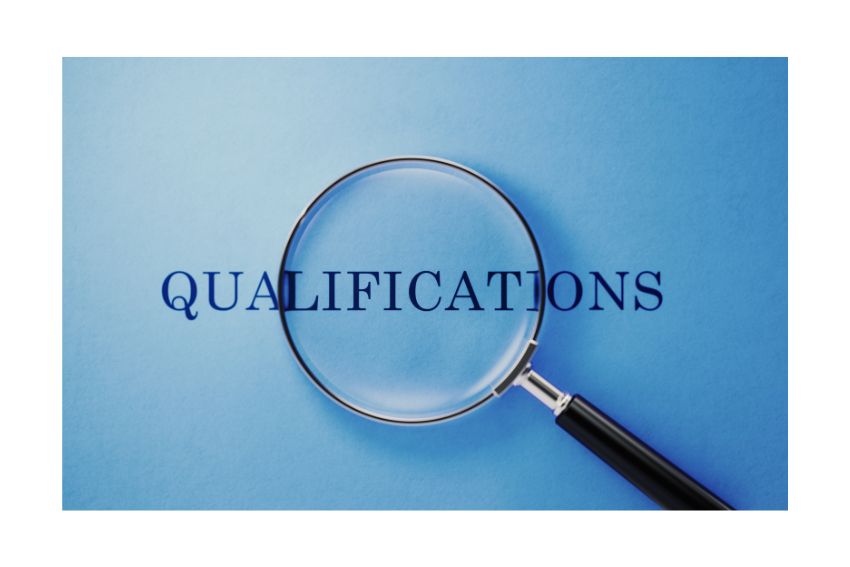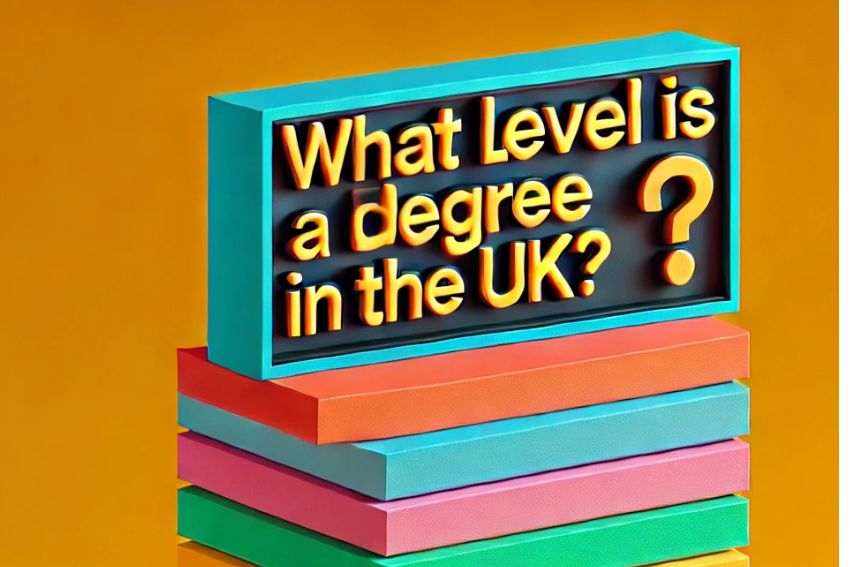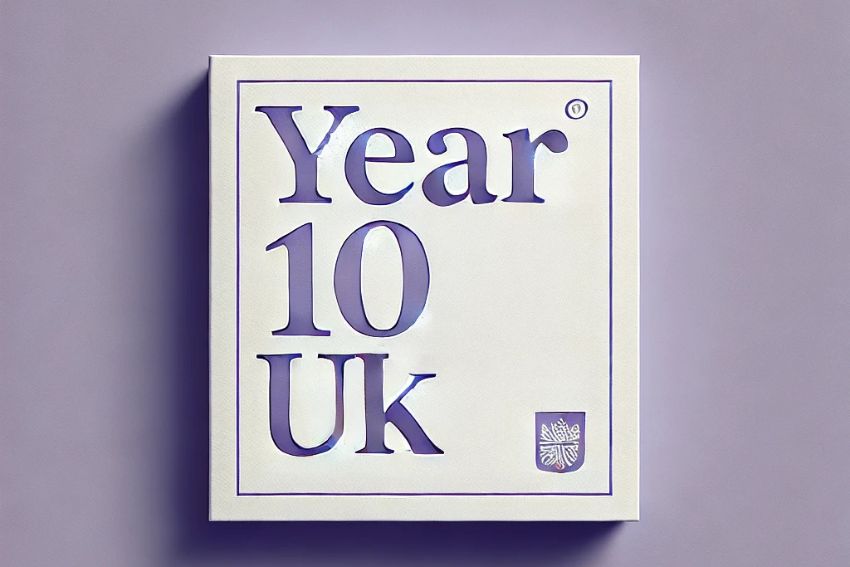Do you want to know everything about education levels and degrees in the UK? If so, you are in the right place. This topic may be confusing not only for students but the parents too. But don’t you worry we got you! Education system at its core lies the Regulated Qualifications Framework (RQF), which categorizes qualifications into levels based on their difficulty and complexity. These education levels explained help students, parents, and professionals understand how qualifications compare and what progression opportunities exist. So what level is a degree?
With our blog, we want to help you better understand this system. We offer a detailed list of the UK’s education levels, from Level 1 to Level 8, by providing clear explanations, examples, and guidance on how to navigate through each stage. By the end, you’ll have a comprehensive understanding of the system and how to use it to your advantage. So, let’s start! Very soon this confusing topic will be clear for you!
What Are the Qualification Levels in The UK?

You may already know that, the UK’s education system is built on a structured framework that defines qualification levels based on their complexity and difficulty. These levels help learners, employers, and educational institutions understand how qualifications compare and what progression opportunities exist. The primary frameworks for this purpose are the Regulated Qualifications Framework (RQF) in England, Wales, and Northern Ireland. And the Scottish Credit and Qualifications Framework (SCQF) in Scotland.
What Level Is a Degree?: The Regulated Qualifications Framework (RQF)
The RQF is the backbone of the UK’s qualification system for England, Wales, and Northern Ireland. It categorizes qualifications into levels, from Entry Level to Level 8 (doctoral-level expertise). Each level reflects the depth, complexity, and difficulty of learning.
Entry Level: Basic skills and knowledge, often suited for beginners.
Levels 1–3: Cover GCSEs, A-levels, and vocational qualifications.
Levels 4–6: Include higher education certificates, diplomas, and bachelor’s degrees.
And Levels 7–8: Include master’s degrees and doctoral qualifications.
The RQF provides a clear pathway for learners to progress academically or professionally, making it easier to plan education and career goals.
What Level Is a degree: Framework for Higher Education Qualifications (FHEQ)
The FHEQ focuses on higher education qualifications, aligning them with RQF levels. It ensures consistency across universities and higher education providers in the UK. For instance:
A bachelor’s degree corresponds to Level 6.
A master’s degree aligns with Level 7.
A PhD or doctorate is at Level 8.
This alignment allows students to transition seamlessly between academic institutions and levels, both nationally and internationally.
Scottish Credit and Qualifications Framework (SCQF)
In Scotland, the SCQF operates alongside the RQF but uses a slightly different structure. The SCQF spans levels 1 to 12, where Level 12 represents doctoral-level qualifications, similar to Level 8 in the RQF.
Scottish Highers (commonly taken at school) are equivalent to RQF Level 3 (A-levels).
An SCQF Level 10 corresponds to an honour degree, equivalent to RQF Level 6.
The SCQF provides flexibility, allowing learners to move between academic and vocational pathways while maintaining clarity on progression opportunities.
What Level IS A Degree: Breakdown of Education Levels (1 to 8)
The UK’s qualification system categorises education into eight levels, with each level representing increasing complexity and depth of knowledge. Here’s a detailed breakdown for you to better understand everything about the education levels:
| Level | Typical Qualifications | Entry Requirements | Duration of Study | Progression Opportunities |
| Level 1 | GCSE grades 1–3 (D–G), Functional Skills Level 1, NVQ Level 1 | No formal qualifications; beginner level | 1 year or less | Progress to Level 2 qualifications or entry-level jobs in retail, customer service, etc. |
| Level 2 | GCSE grades 4–9 (A*–C), NVQ Level 2, BTEC First Diploma | Completion of Level 1 or equivalent | 1–2 years | Progress to Level 3 (e.g., A-levels) or skilled roles in construction, healthcare support. |
| Level 3 | A-levels, BTEC National Diploma, NVQ Level 3, IB | GCSEs or equivalent Level 2 qualifications | 2 years (varies for vocational) | Prepare for higher education (university) or skilled employment such as technician roles. |
| Level 4 | Higher National Certificate (HNC), CertHE, NVQ Level 4 | Level 3 qualifications (A-levels or equivalent) | 1 year full-time | Progress to Level 5 (HND or Foundation Degree) or mid-level roles in engineering, business. |
| Level 5 | Foundation Degree, Higher National Diploma (HND), Level 5 Diplomas | Level 3 qualifications (e.g., A-levels) | 2 years full-time | Transition to Level 6 (Bachelor’s degree) or careers in IT, hospitality, or design. |
| Level 6 | Bachelor’s Degree (BA, BSc, BEng), Degree Apprenticeships | Level 3 qualifications (e.g., A-levels) | 3–4 years | Prepare for postgraduate study (Level 7) or professional careers in teaching, accounting. |
| Level 7 | Master’s Degree (MA, MSc, PGCE), Professional Master’s (MBA) | Bachelor’s Degree or equivalent | 1–2 years full-time | Access to research roles, highly specialised careers, or doctoral studies (Level 8). |
| Level 8 | Doctoral Degree (PhD, MD), Professional Doctorates (EdD, DBA) | Master’s Degree or equivalent | 3–4 years full-time | Pursue academic, research, or leadership roles in various industries. |
What is the Progression Opportunities?
For more clearance let’s sum up key topics about education levels:
Levels 1–3: Focus on foundational and intermediate skills for further education or entry-level employment.
4-6 Levels: Higher education qualifications for career advancement and professional development.
And Levels 7–8: Postgraduate and doctoral qualifications for expert-level knowledge, research, and leadership roles.
By understanding these levels, students and parents can make informed decisions about education pathways. The can align academic achievements with career goals.

What Level Is a Degree in the UK?
Degrees in the UK are classified under the Regulated Qualifications Framework (RQF) and the Framework for Higher Education Qualifications (FHEQ), which categorize qualifications based on their complexity and depth of learning. Here’s a breakdown of degree levels in the UK:
Bachelor’s Degree: Level 6
So, what is bachelor’s degree? A Bachelor’s degree, such as a BA (Bachelor of Arts) or BSc (Bachelor of Science), is a Level 6 qualification.
It provides advanced knowledge in a specific field, developing critical thinking, research skills, and expertise. To achieve this degree it typically takes 3–4 years for full-time study. A Bachelor’s degree is often the minimum requirement for many professional roles and serves as a stepping stone for postgraduate education.
Master’s Degree: Level 7
Now let’s talk about a Master’s degree. A Master’s degree, such as an MA (Master of Arts) or MSc (Master of Science), is a Level 7 qualification.
It builds on the foundation of a Bachelor’s degree, offering specialized knowledge and advanced research or practical skills. Master’s degree Usually takes 1–2 years for full-time study. Master’s degrees are essential for careers requiring in-depth expertise, such as academia, leadership roles, or highly technical professions.
Doctoral Degree: Level 8
And finally, a Doctoral degree, such as a PhD (Doctor of Philosophy) or professional doctorates like EdD (Doctor of Education), is a Level 8 qualification.
Doctoral degree typically takes 3–4 years for full-time study. It represents the highest level of academic achievement. It focuses on original research that contributes new knowledge to a field. Doctorates are necessary for academic, research, and top-tier professional roles. They demonstrate exceptional expertise and the ability to conduct independent research.
What Level Is a Degree: Comparison Table of Degree Levels in the UK
For more clearance here is a detailed chart for you:
| Degree Level | Level (RQF/FHEQ) | Qualification Examples | Duration | Importance |
| Bachelor’s Degree | Level 6 | BA, BSc, BEng, LLB | 3–4 years full-time | Entry requirement for many professional roles and foundation for postgraduate education. |
| Master’s Degree | Level 7 | MA, MSc, MBA, PGCE | 1–2 years full-time | Required for advanced or specialised roles; builds on Bachelor’s-level knowledge. |
| Doctoral Degree | Level 8 | PhD, MD, EdD, DBA | 3–4 years full-time | Necessary for academic, research, or leadership roles; represents the highest level of expertise. |
Regional Variations Across the UK
As we discuss topic of educational levels and understand what level is a degree, now it is important to talk about regional differences. Keep up, it’s nothing we can’s handle.
The UK’s education system is divided into distinct frameworks based on regions, with slight variations in terminology and structure. While England, Wales, and Northern Ireland primarily use the Regulated Qualifications Framework (RQF), Scotland follows the Scottish Credit and Qualifications Framework (SCQF). These frameworks align in terms of progression and level complexity. Although, they differ in how they categorize and name qualifications.
Education in England, Wales, and Northern Ireland (RQF)
The RQF provides a unified structure for qualifications across these three regions.
It includes academic qualifications like GCSEs, A-levels, and university degrees, as well as vocational qualifications like NVQs and BTECs. The framework spans Entry Level to Level 8, covering foundational knowledge to doctoral-level expertise.
Wales also incorporates the Credit and Qualifications Framework for Wales (CQFW), which works in tandem with the RQF while emphasising Welsh-specific qualifications.
Education in Scotland (SCQF)
Now, lets Talk about Scotland. Scotland uses the Scottish Credit and Qualifications Framework (SCQF), which spans Levels 1 to 12.
SCQF levels correspond closely to RQF levels but differ in qualification names. For example: Scottish Highers (Level 6 SCQF) align with A-levels (Level 3 RQF). A Scottish Honours Degree (Level 10 SCQF) aligns with a Bachelor’s degree (Level 6 RQF).
The SCQF is broader, encompassing both academic and vocational pathways in a unified system.
What are Key Differences for Educational Levels Across the UK?
Qualification Names: In Scotland, Highers and Advanced Highers replace A-levels. Vocational qualifications may have different titles but similar standards.
Levels: SCQF has 12 levels compared to the RQF’s 8 levels. The additional levels in SCQF provide more granularity, particularly at the higher stages.
Curriculum Emphasis: Scottish qualifications often integrate broader, interdisciplinary learning. While, Wales emphasises bilingual education and includes Welsh-specific qualifications.
Assessment Methods: Scotland uses continuous assessment more extensively, while England, Wales, and Northern Ireland rely more on final exams.
Comparison Table: RQF vs SCQF Levels
We created a detailed table for you, to better understand about key differences. We hope it helps you.
| Qualification Type | RQF Level | SCQF Level | Examples of Qualifications |
| Entry Level | Entry Level | Levels 1–3 | Entry Level Certificate, Basic Skills |
| GCSE Grades 1–3 (D–G) | Level 1 | Level 4 | National 4 in Scotland |
| GCSE Grades 4–9 (A*–C) | Level 2 | Level 5 | National 5 in Scotland |
| A-levels / Advanced Higher | Level 3 | Level 6 | A-levels (RQF), Highers / Advanced Highers (SCQF) |
| Higher National Certificate (HNC) | Level 4 | Level 7 | HNC (both frameworks) |
| Higher National Diploma (HND) | Level 5 | Level 8 | HND (both frameworks) |
| Bachelor’s Degree (Honours) | Level 6 | Level 10 | BA, BSc, Scottish Honours Degree |
| Master’s Degree | Level 7 | Level 11 | MA, MSc, Postgraduate Diplomas |
| Doctoral Degree | Level 8 | Level 12 | PhD, Professional Doctorates |
While the RQF and SCQF systems differ in structure and terminology, they align closely in the complexity and progression of qualifications.
Why You Should Understand Education Levels?

Understanding what level is a degree and everything about educational levels is crucial for anyone navigating the UK’s education system. Whether you’re a student planning your next steps, a parent supporting your child’s journey. These levels provide a clear framework for evaluating qualifications. And you get informed decisions about education, careers, and personal development.
Benefits for Academic Progression
Education levels act as stepping stones, guiding learners through their academic journeys.
By knowing how qualifications align (e.g., GCSEs to A-levels to degrees), students can map out their paths with confidence.
They help identify prerequisites for higher education, such as the necessary A-levels or equivalent qualifications for university admission.
Understanding these levels also assists in choosing the right courses, ensuring students are prepared for the complexity of the next stage.
For instance, a student aiming for a degree in engineering might realise that A-level Maths and A-level Physics (Level 3) are essential, paving the way for a Bachelor’s degree (Level 6).
Benefits for Career Development
Education levels directly influence career opportunities and salary potential.
Many industries require specific qualifications, such as a Level 3 diploma for a skilled trade or a Level 6 bachelor’s degree for entry-level professional roles.
Higher levels, such as Level 7 (Master’s degree) or Level 8 (Doctorate), often lead to specialised or leadership positions, giving individuals a competitive edge in their fields.
Additionally, vocational qualifications like NVQs and apprenticeships provide hands-on skills valued by employers, bridging the gap between education and the workplace.
By understanding the required qualification levels for their desired career, individuals can tailor their learning paths to meet industry demands.
Benefits for Applying for Jobs or Further Education
You may already understand that a clear knowledge of education levels helps individuals stand out during applications for jobs or further study.
For jobs: for future you should know that employers use levels to evaluate candidates’ qualifications and suitability for roles. For example, a Level 2 NVQ may qualify someone for an entry-level role, while a Level 6 bachelor’s degree might be required for managerial positions.
Also, for further education: Universities and colleges often specify entry requirements based on qualification levels, such as Level 3 A-levels or BTECs for undergraduate courses.
What Level Is E Degree – Study and Career Guidance For You
We know that sometime navigating the UK’s education system can be overwhelming, but understanding how qualifications align with career goals is the key to making informed decisions. Whether you’re a student planning your future or a parent supporting your child, here are practical tips to ensure success. Let’s start!
Choose the Right Qualification Based on Career Goals
The first step in making the right educational choices is aligning qualifications with long-term career aspirations. And that is not easy thing to do. but we have some advices that hopefully will help you.
For Academic Pathways: If your goal is a profession that requires a degree, such as medicine or engineering, focus on progressing through Level 3 (A-levels or equivalent) to Level 6 (Bachelor’s degree). Select subjects that are prerequisites for your chosen career, like Biology and Chemistry for medicine or Maths and Physics for engineering.
For Vocational Careers: If you’re aiming for a practical trade like plumbing or childcare, vocational qualifications such as Level 2 or 3 NVQs and apprenticeships offer hands-on skills and a direct route into employment.
Choosing qualifications that align with career goals ensures efficient progression and avoids unnecessary detours.
What Level Is A Degree – How To Understand Pathways Between Levels?
Knowing how to transition between education levels helps you to plan effectively.
From GCSEs to A-levels (Level 2 to Level 3): Choose A-levels or vocational qualifications that match your career interests. For example, a student interested in architecture might select Art, Maths, and Design Technology.
From A-levels to Degrees (Level 3 to Level 6): Research degree requirements early to ensure you meet university criteria. For example, many universities require specific grades and subjects at A-level for entry into competitive courses. So prepare early and start planning accordingly.
Vocational to Academic Pathways: Vocational qualifications like an HND (Level 5) can lead to a Bachelor’s degree (Level 6) through top-up courses, offering a flexible route to higher education.
By understanding these pathways, you can make smooth transitions without missing essential qualifications. And what is the most important your time.
Role of Education Advisors and Online Resources
Education advisors and online platforms are invaluable for personalized guidance and support. So be smart and if you can use them all!
Education Advisors: Schools, colleges, and career services offer expert advice on choosing qualifications. They help you to explore career options, and planning progression routes. Advisors can help align your interests with suitable courses and provide insights into less obvious opportunities.
Online Resources: Platforms like UCAS, National Careers Service, and online learning portals provide detailed information about courses, entry requirements, and progression routes. They also offer tools like career quizzes to match skills and interests with potential careers.
Online Tutoring Services: Tutors can provide tailored support, helping students excel in their current level of study and prepare for the next. For example, a Online GCSE tutor can guide students toward achieving grades needed for A-levels, while an online A-level tutor can focus on university preparation.
Conclusion Of What Level Is A Degree
To sum up our blog we should state that understanding the UK’s qualification levels is essential for both academic and career success. These levels provide a clear framework for navigating the education system, enabling students and parents to make informed decisions about progression pathways, career opportunities, and long-term goals. From foundational qualifications at Level 1 to advanced doctoral degrees at Level 8, each level offers unique opportunities for personal and professional growth.
Believe us! when you know how qualifications align with career aspirations can streamline the path to success. Whether pursuing academic qualifications like A-levels and degrees or vocational routes like NVQs and apprenticeships, understanding the framework ensures that every step is purposeful.
To further explore your options, take advantage of available resources. Education advisors, online platforms, and career planning tools can be very useful. Additionally, seeking guidance from online tutors can provide tailored support, helping you to excel in your studies and prepare for the future journey.
We hope our blog was clear and helpful for you and wish you the best on your educational journey! Good luck!
FAQ’s For What Level Is A Degree
What are the differences between Level 3 and Level 4 qualifications
Level 3 qualifications are considered advanced and prepare students for higher education or skilled employment. They focus on broad knowledge and foundational skills.
Level 4 qualifications are higher education-level courses that focus on specific technical or professional skills. They are often the first step into specialized fields or higher-level study.
How do NVQs fit into the qualification levels?
NVQs are included in the UK’s qualification levels, ranging from Level 1 to Level 7. They focus on practical, workplace-based skills. They are ideal for individuals pursuing careers in trades, healthcare, or technical fields. NVQ Level 2 is equivalent to GCSEs, while NVQ Level 3 aligns with A-levels.
Are international qualifications equivalent to UK levels?
Yes, many international qualifications have equivalents in the UK’s education framework. For example: the International Baccalaureate (IB) Diploma is equivalent to Level 3 (A-levels). Bachelor’s degrees from accredited universities are typically equivalent to Level 6.
To verify equivalency, students can consult services like UK ENIC, which evaluates and compares international qualifications.
Can you skip levels in education?
Generally, skipping levels is not common because each level builds on the knowledge and skills of the previous one. However:
Alternative pathways like Access to Higher Education Diplomas can allow students to bypass traditional routes. While meeting entry requirements for higher-level qualifications.
Exceptions may occur if a student demonstrates advanced skills or knowledge (e.g., moving from Level 2 directly to Level 4 in vocational settings).








